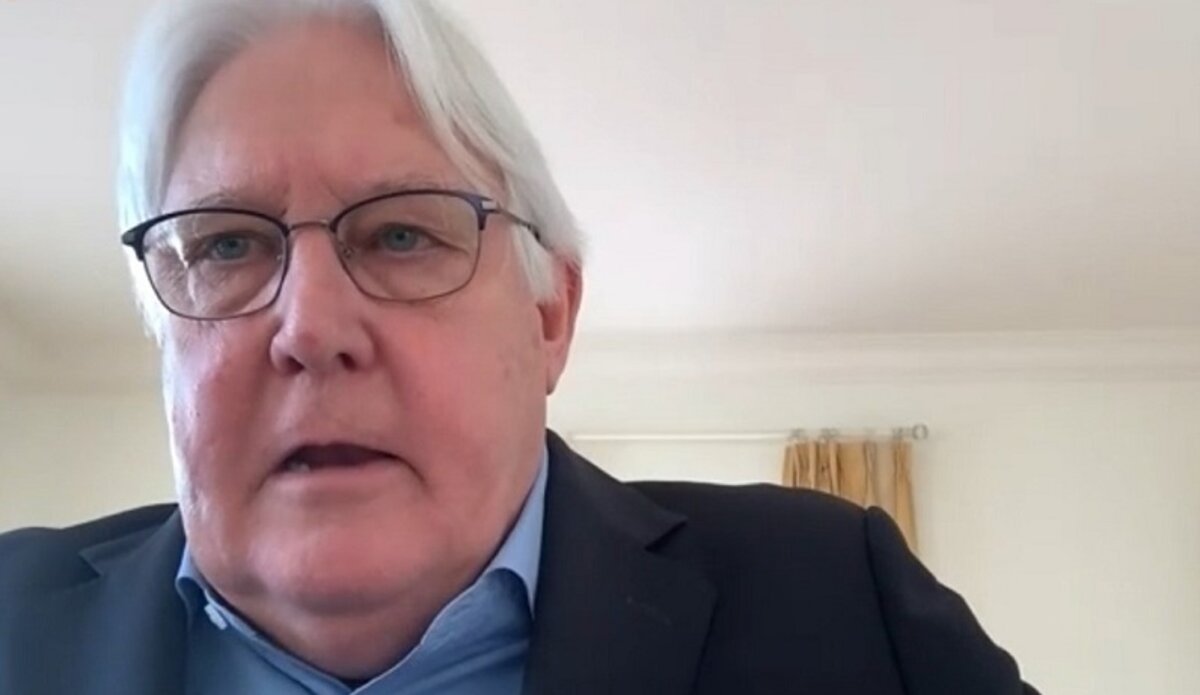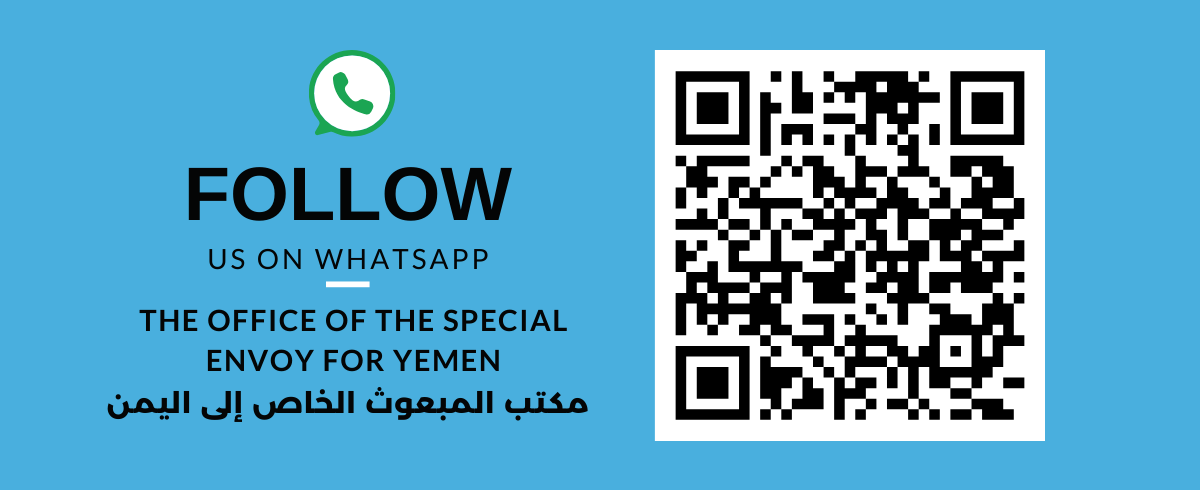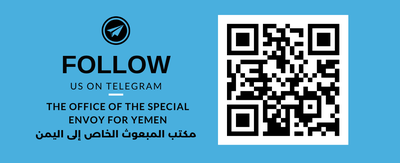Remarks by Special Envoy Martin Griffiths at a webinar on COVID-19 media coverage in Yemen
Remarks by the UN Special Envoy, Martin Griffiths, at the opening of a webinar organized by the French Agency for Media Development (CFI), supported by the EU on COVID-19 media coverage in Yemen.
Thanks a lot. Thanks very much indeed, Nawal.
Thank you very much to CFI of course, for inviting me today. But also, perhaps more importantly, for working so diligently. I am really, really pleased to be reminded of that. That you did in fact bring, reporters to Sweden two years ago. And that is huge. I want to refer to that a bit later, to real time genuine reporting on what is going on. Especially in the context in which I work, it is of the highest importance. So, thank you very much.
Thank you to Hans from European Union. Hans is a devoted Ambassador. All ambassadors, of course, are devoted, but Hans is particularly so in the way you believe profoundly and deeply in the EU mission to make Yemen, from whatever they can do, a better place. So, thank you to Hans of the European Union.
I am very pleased actually, again, on a personal note, to see Ahmed again, because he is a man who is constantly in a good mood and lifting all the rest of our moods. It is remarkable how he does that. Mr. Ahmed Baider, you are a guru. Thank you very much.
The topic is COVID-19, and how it affected journalism in Yemen, and the new dilemmas it has created for all of us. And it certainly has affected my work as well, in many ways. One of the worst ways, in fact, that it has impacted the work of our mission has nothing to do with health and medicine, fortunately for us. But it is about the limitations it has placed on our ability to engage directly with the parties and face to face. We have been trying to negotiate an agreement on a ceasefire and other matters since March. And it has all been shuttle diplomacy for that reason. It has hugely slowed down the progress of those efforts. Anyway, a difficult prospect. I mention this because recently, as some of you know, we were able to convene the parties physically in a face to face meeting about the issue of prisoners’ release. And the release of prisoners is something that was extensively discussed in Stockholm two years ago, as you know, but, until recently, never resulted in a single prisoner being released.
But on this occasion, in Switzerland, six weeks or more ago, the parties met. They sat down, they argued together and eventually produced the agreement that led to over a thousand families recovering their loved ones. And for me, the sense of each life being more important than all lives was clearly demonstrated on that day. And I believe that this gives a message of hope and a reason for us to try to bring the parties together. That is not enough. Because they need nudging. They need to be supported. They need to be advised, let us be honest. And that is something which I know the journalists of Yemen are doing on a daily basis. But it gives me some hope for the future.
Actually, of course, the digital world in this time of trouble is, for somebody like me, a new discovery. And it offers fantastic opportunities, there is no doubt. The United Nations, almost certainly belatedly, but finally is picking up on this, and on the way in which digital engagement can bring inclusion at a level which has not been imagined before. So, we do not rely only on people physically going to a meeting to be involved in a discussion.
Thierry referred to CFI bringing a dozen journalists to Sweden and that was fantastic. And in future talks, we should be able to establish digital engagement throughout the talks, day and night about what is going on, so that even if you are not physically there you participate and your voice is heard.
I am very excited about that. We had a virtual conversation with hundreds of civil society actors, including journalists, some time ago. And we are going to continue it. And our colleagues in Libya, have done the same. I think it is the wave of the future, in that particular respect.
Today is the International Human Rights Day, I am reminded. And it marks the day when, 72 years ago, the United Nations’ General Assembly adopted the Universal Declaration of Human Rights. And in the very first line of that preamble, as we all know, the declaration justifies itself as a “recognition of the inherent dignity and the equal and inalienable rights of all members of the human family as the foundation of freedom, justice and peace.” Individual rights are the basis of freedom, justice and peace.
Now, I mention this because I often try to explain my role as a mediator. For me, being a mediator means I must be impartial with the parties, standing at an equal distance from the parties at all times. This is often misunderstood, as you know, but it means that the parties set the agenda and they negotiate with each other in a process facilitated by me and my Office. But the reason I mention that is because particularly today, and particularly in the context of this meeting, I want to stress that it does not mean to say that a mediator stands for nothing.
Of course, I stand for the principles of the United Nations which means I am committed to helping the parties reach a political settlement that does not deny Yemenis their right to hold their leaders to account, a crucial part of the future of Yemen, and their right to equal citizenship across the country. And I stand for an inclusive process that will, I hope, allow all Yemenis to contribute to the shaping of what is to come to Yemen. I stand for a Yemeni political dialogue designed to usher in a future that does not reproduce the injustices of the present that you have been reporting and continue to do so.
So those are some of my guiding principles. And I think one of the challenges of peacemaking is to maintain the balance between a future vision founded on those principles, and the immediate need to engage with the parties on something much more pedestrian and much more operational and much more pragmatic, to make progress to end the war. And I believe, ending the war is a prospect, which is way overdue. But it is possible; it is doable. That will be done.
As others have said before me already, this future that we are talking about, this vision of a Yemen based on rights and principles and freedoms and on accountable leadership, is impossible without you — without an independent civil society, and, particularly in this context, but also in any context, without a free media to keep people honest, and to guide the rest of the population. I am, like you, very concerned. In all of the miseries of this war, and all of the miseries of this unnecessary and unwelcome conflict, I am extremely concerned about the shrinking space of press freedom including threats to journalists’ physical security and to their families, detention, death sentences against journalists and even worse, as you know, assassinations. This is a tendency and a pattern of grave concern to all those who want a future for Yemen based on freedoms. And of course, I will continue, to the extent that I can, to urge the parties to respect and protect press freedom. Keep Ahmed Baider smiling.
The freedom of expression and assembly are the foundations of a healthy political life, and the most basic guarantees of equal citizenship. So, it falls to me, with great humility and modesty to admire you, and congratulate you for upholding these basic principles. And you do that in your daily work. And you do that every time you produce reporting which is valid, objective, and true. Every time that happens, there is a little more hope for future Yemen.
Finally, now thank you very much and I would like to, of course, congratulate the journalists, the reporters who will be receiving the awards today. It is well deserved. And I am sure there are more who deserve rewards, as well, and these will come. I hope 2021 will be a year when we shall see freedom again finally in Yemen. Thank you very much.
 UN
UN







